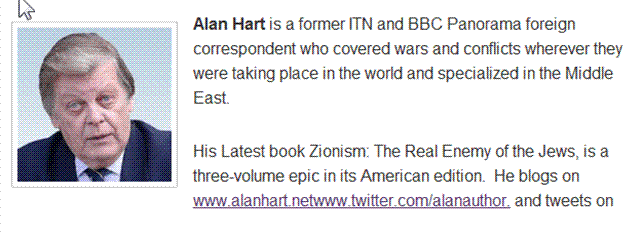
Should Saudi King Abdullah invite Netanyahu to Riyadh?
By Alan Hart
The suggestion that he should was made by Thomas L. Friedman in his column for the New York Times on 7 September. My first response was to say to myself, “That proves Friedman doesn’t understand the complexities of the conflict and is at least a little bit bonkers.”
But the more I thought about it, the more it seemed to me that King Abdullah should do what Friedman suggested. In a moment I’ll get to what I think the Arabs and the Palestinians especially would have to gain without losing anything, but first here’s the essence what Friedman wrote.
He noted that eight years have passed since the Arab peace initiative pushed by Abdullah when he was Crown Prince was presented to, and approved by, an Arab League summit in Beirut. (It offered a full and final peace, including the normalizing of relations between the entire Arab region and Israel, in exchange for a complete Israeli withdrawal from all territories occupied in 1967, including East Jerusalem, and a “just solution” to the Palestinian refugee problem).
Friedman then commented that the plan has been “floating out there in the ether of diplomatic possibilities” ever since its approval in 2002. “It is time to bring it out of the air. King Abdullah should invite Mr. Netanyahu to Riyadh and present it to him personally.”
Friedman went on:
“Abdullah need not go to Jerusalem, as Anwar Sadat did, or recognize Israel. He can, though, still have a huge impact on the process by simply handing his plan to the leader for whose country it was intended. I can’t think of anything that would get these peace talks off to a better start. It feels to me as though Netanyahu is taking this moment seriously, but he is still very wary. By handing him the Abdullah plan, the Saudi monarch would unleash a huge peace debate in Israel. It would make it more difficult for Netanyahu to continue settlement building – and spur an Israeli public that is also still wary to urge Netanyahu to take risks for peace and support him for doing so. Netanyahu is the only Israeli leader today who can deliver a deal.
“The Saudis can’t just keep faxing their peace initiative to Israelis. That has no emotional punch. It actually says to Israelis: if the Saudis are afraid to hand us their plan, why should we believe they’ll have the courage to implement it if we do everything they suggest? Israelis are isolated. Seeing their prime minister received by the most important Muslim leader in the world in Riyadh would have a real impact.
“Both Israelis and Palestinians are going to have to do something really hard to produce a two-state solution. Saudi officials have developed a reputation in Washington for being experts at advising everyone else about the hard things they must do, while being reluctant to step out themselves. This is their moment – to do something hard and to do something important.”
Netanyahu has apparently said that he will go anywhere for peace, so let’s suppose for the sake of discussion that King Abdullah does invite him to Riyadh and he goes.
Either at his meeting with Abdullah to take personal delivery of the Arab peace plan or afterwards, Netanyahu would say there was one element of it that was completely unacceptable to all Israelis – the proposal that a just solution to the Palestinian refugee problem should be on the basis of UN Resolution 194 of 11 December 1948. Its key words are the following:
“… the refugees wishing to return to their homes and live at peace with their neighbours should be permitted to do so at the earliest practicable date, and that compensation should be paid for the property of those choosing not to return and for loss of or damage to property which, under principles of international law or in equity, should be made good by the Governments or authorities responsible.”
Down the years (and consistent with its Nakba denial), Israel has put two fingers up to Resolution 194 and denied the Palestinians a right of return, on the grounds that conceding the right would be an act of national suicide. As it was put, for example, by Likud spokesman Zalman Shoval in March 2007, “If 300,000-400,000, or maybe a million, Palestinians would invade the country, that would be the end of the state of Israel as a Jewish state.”
A truth, which all of Israel’s leaders have known for many years, is that the Palestinian right of return does not have to be an obstacle to peace unless they want it to be. Under the pragmatic Arafat’s leadership, the decision was taken to accept that in the event of a genuine and viable two-state solution, the right of return would have to be limited to the territory of the Palestinian state. Though they could not say so in public, Arafat and his leadership colleagues were completely aware this would mean that probably not more than 100,000 refugees would be able to return and that the rest would have to settle for compensation.
Another truth is that Jerusalem does not have to be an obstacle to peace unless Israel’s leaders want it to be. If they don’t want Jerusalem to be divided again, the Arabs will say, “Okay. Let it be an open, undivided city and the capital of two states.”
My point so far is that if Netanyahu did go to Riyadh, he would discover that the Arab peace plan of 2002, subject only to clarifications of the flexibility of the Arab position on the right of return and Jerusalem, actually offers what a rational Israeli government and people would accept with relief.
What would the Arabs and the Palestinians especially have to gain if King Abdullah did invite Netanyahu to Riyadh and he went?
In one scenario, and assuming that most Israelis are not beyond reason (an assumption I do not make), it might unleash what Friedman described as a “huge peace debate in Israel.” And that just might open the door to peace on terms virtually all Palestinians and most other Arabs and Muslims everywhere could just about accept.
In another scenario – continued Israeli rejection of the Arab peace plan of 2002 – it would enable King Abdullah and all of his Arab brothers at leadership level to say to the world, and America especially, something like: “Now you cannot be in any doubt about what the obstacle to peace is – Zionism. If you really want peace, you must now play your part and use the leverage you have to call and hold Zionism to account for its crimes.”
If that didn’t mobilize support in the Western world for an acceptable measure of justice for the Palestinians and peace for all, nothing ever will.
Footnote:
Some readers will say that a genuine and viable two-state solution, even if it was possible, is unacceptable because it would not provide the Palestinians with enough justice. My response is quite simple. One state for all is by far the best solution for all; but because of the reality of the existence of a nuclear-armed Zionist entity, the two-state solution is the best deal the Palestinians are ever likely to get.


Alan Hart is a former ITN and BBC Panorama foreign correspondent who has covered wars and conflicts wherever they were taking place in the world and specialized in the Middle East. His Latest book Zionism: The Real Enemy of the Jews, Vol. 1: The False Messiah, is a three-volume epic in its American edition. He blogs on AlanHart.com.
ATTENTION READERS
We See The World From All Sides and Want YOU To Be Fully InformedIn fact, intentional disinformation is a disgraceful scourge in media today. So to assuage any possible errant incorrect information posted herein, we strongly encourage you to seek corroboration from other non-VT sources before forming an educated opinion.
About VT - Policies & Disclosures - Comment Policy



